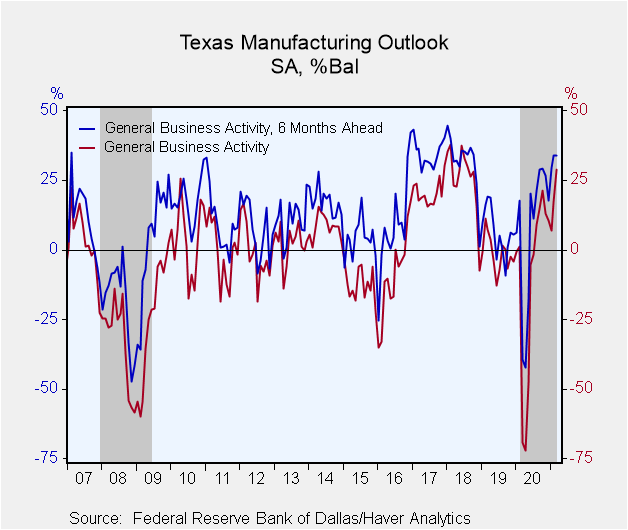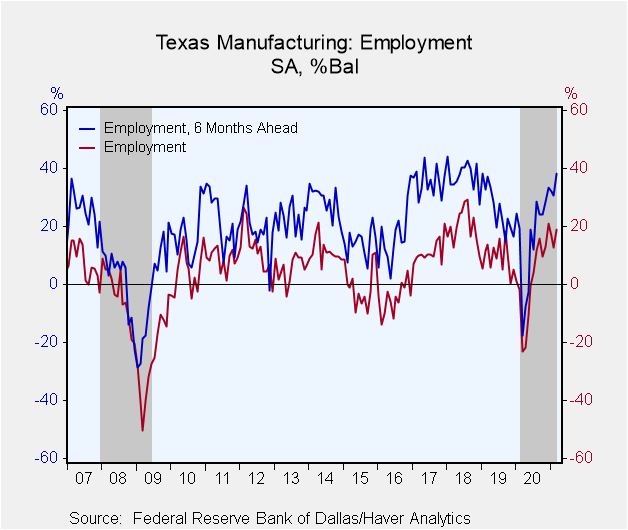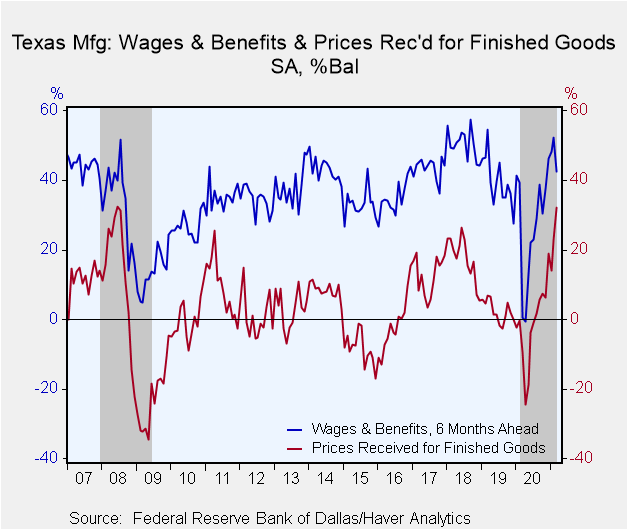 Global| Mar 29 2021
Global| Mar 29 2021Texas Manufacturing Activity Improves Markedly in March; Production Sets Record
by:Tom Moeller
|in:Economy in Brief
Summary
• New orders growth & employment strengthen. • Prices received & labor costs also rise. • Expectations are little changed, remaining near 2018 high. Manufacturing activity in Texas continued to improve during March. The Texas [...]
• New orders growth & employment strengthen.
• Prices received & labor costs also rise.
• Expectations are little changed, remaining near 2018 high.
Manufacturing activity in Texas continued to improve during March. The Texas Manufacturing Outlook Survey, conducted by the Federal Reserve Bank of Dallas, indicated that the General Business Activity Index rose to 28.9 this month from 17.2 in February. It was the highest level since August 2018. Forty-two percent of respondents reported improved business activity, up from 29.0% in February. The survey was conducted from March 16-24 and there were 111 manufacturers in the survey.
The production measure surged to a record 48.0 from 19.9 last month. (The series dates back to June 2004.) The growth rate of new orders measure also strengthened to 22.7, the highest level in roughly three years. A strengthened 35.2% of respondents reported faster new orders growth, up from 10.2% twelve months earlier. The shipments measure also surged as did unfilled orders, the latter to a 2005 high.
The employment reading edged higher to 18.8% in March from 12.7% in February, remaining well below the August 2018 high of 29.2%. An improved 28.8% of respondents reported more hiring, but that remained down versus the July 2018 high of 35.7%. The wages and benefits reading jumped 12 percentage points to 28.0%, up from 4.8% twelve months earlier. Hours worked also lengthened.
The measure of prices received for finished goods rose sharply to 32.2% from 23.0%. It occurred after a similar-sized increase in February. The March increase reflected a near-record 35.8% of respondents reporting higher prices while just 3.6% reported price declines. The index of prices paid for raw materials surged to 66.0 from 57.4, up from price deflation twelve months earlier. Sixty-nine percent of respondents reported higher prices.
The headline index of expectations for overall business activity in six months eased to 33.7% from 33.9% in February. The figure nevertheless remained near the late-2018 high. Expectations for new orders growth improved, but expected production deteriorated. The expected employment measure rose to its January 2018 high, while expected hours-worked fell sharply. Expected wages weakened m/m, but remained elevated versus early last year.
Each index is calculated by subtracting the percentage reporting a decrease from the percentage reporting an increase. When all firms report rising activity, an index will register 100. An index will register -100 when all firms report a decrease. An index will be zero when the number of firms reporting an increase or a decrease is equal. Data for the Texas Manufacturing Outlook can be found in Haver's SURVEYS database.
| Texas Manufacturing Outlook Survey (SA, % Balance) | Mar | Feb | Jan | Mar '20 | 2020 | 2019 | 2018 |
|---|---|---|---|---|---|---|---|
| Current General Business Activity Index | 28.9 | 17.2 | 7.0 | -69.3 | -10.6 | -1.2 | 25.8 |
| Production | 48.0 | 19.9 | 4.6 | -35.2 | 3.7 | 8.9 | 21.4 |
| Growth Rate of New Orders | 22.7 | 11.6 | 5.9 | -44.3 | -5.3 | -1.1 | 14.8 |
| Employment | 18.8 | 12.7 | 16.6 | -23.2 | 1.6 | 9.5 | 20.0 |
| Wages & Benefits | 28.0 | 16.1 | 17.6 | 4.8 | 11.5 | 23.5 | 29.7 |
| Prices Received for Finished Goods | 32.2 | 23.0 | 13.9 | -9.6 | -1.7 | 2.5 | 17.6 |
| General Business Activity Index Expected in Six Months | 33.7 | 33.9 | 29.6 | -39.4 | 6.6 | 6.4 | 31.6 |
| Production | 38.3 | 40.2 | 43.7 | -18.6 | 31.3 | 35.6 | 48.6 |
| Growth Rate of New Orders | 34.0 | 25.8 | 29.8 | -20.8 | 23.9 | 25.2 | 35.8 |
| Employment | 38.4 | 30.8 | 31.9 | -17.5 | 15.5 | 26.0 | 37.7 |
| Wages & Benefits | 42.4 | 52.1 | 48.3 | 0.6 | 26.7 | 39.7 | 50.4 |
Tom Moeller
AuthorMore in Author Profile »Prior to joining Haver Analytics in 2000, Mr. Moeller worked as the Economist at Chancellor Capital Management from 1985 to 1999. There, he developed comprehensive economic forecasts and interpreted economic data for equity and fixed income portfolio managers. Also at Chancellor, Mr. Moeller worked as an equity analyst and was responsible for researching and rating companies in the economically sensitive automobile and housing industries for investment in Chancellor’s equity portfolio. Prior to joining Chancellor, Mr. Moeller was an Economist at Citibank from 1979 to 1984. He also analyzed pricing behavior in the metals industry for the Council on Wage and Price Stability in Washington, D.C. In 1999, Mr. Moeller received the award for most accurate forecast from the Forecasters' Club of New York. From 1990 to 1992 he was President of the New York Association for Business Economists. Mr. Moeller earned an M.B.A. in Finance from Fordham University, where he graduated in 1987. He holds a Bachelor of Arts in Economics from George Washington University.










